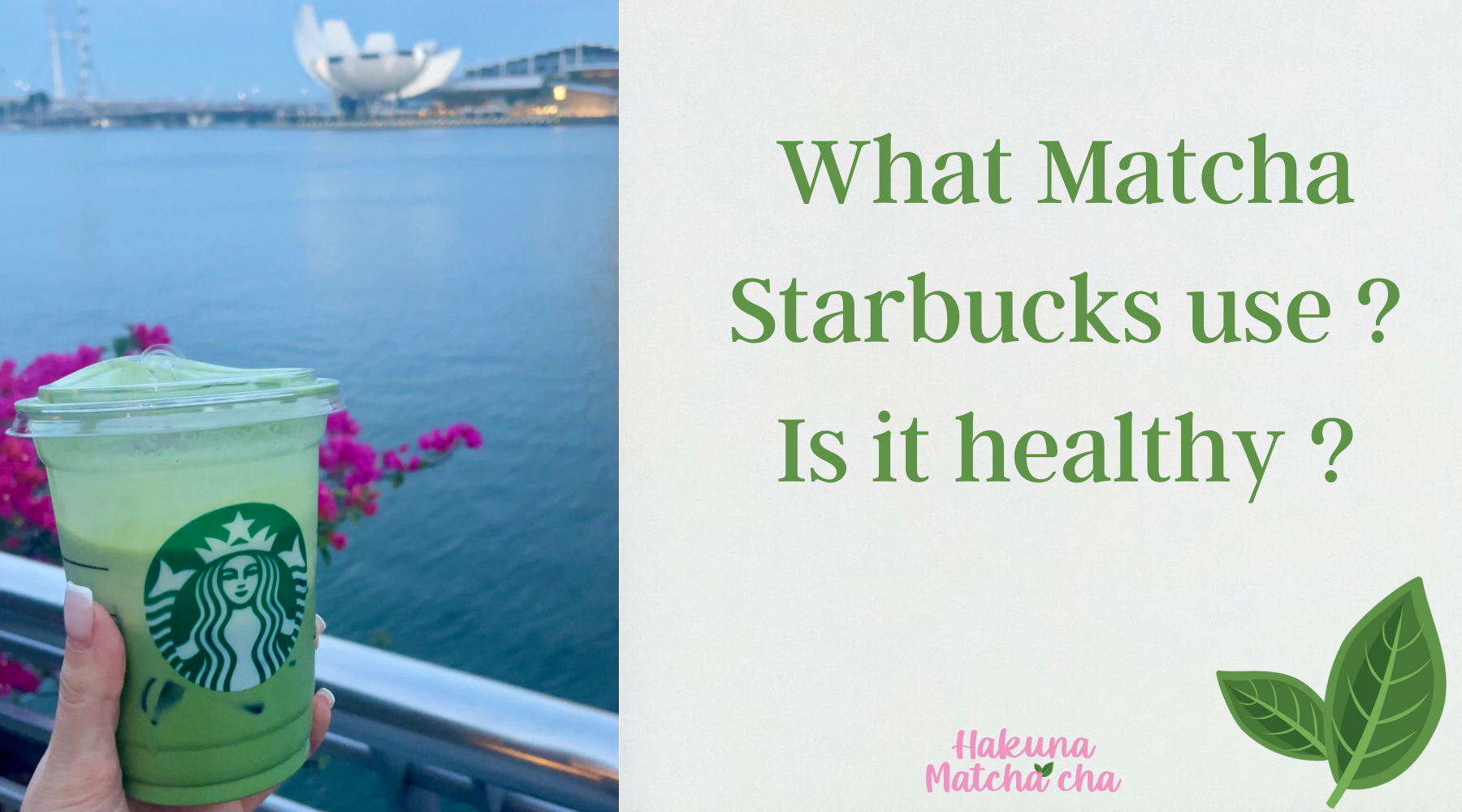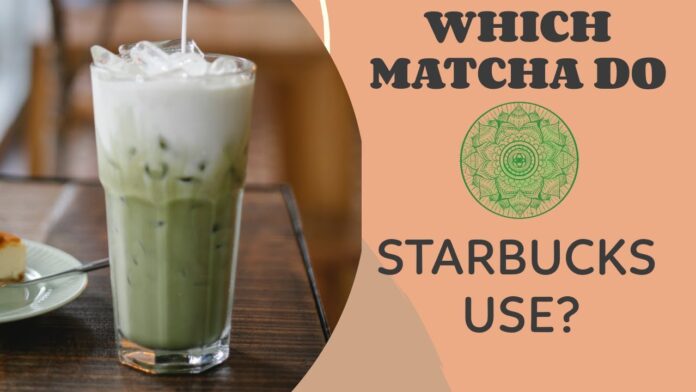Starbucks uses a sweetened matcha blend with sugar as the first ingredient. The matcha powder they use is not traditional Japanese matcha.
When it comes to enjoying a refreshing matcha beverage, Starbucks is a popular go-to spot for many people. However, it’s essential to understand the type of matcha used in Starbucks’ drinks. The matcha powder Starbucks uses is not the traditional, high-quality ceremonial grade matcha.
Instead, it is a sweetened matcha blend with sugar listed as the primary ingredient. This means that the matcha served at Starbucks may not offer the same health benefits as authentic matcha. Understanding the type of matcha used by Starbucks can help consumers make informed choices when selecting their beverages.
The Quest For Starbucks’ Matcha
Welcome to the Quest for Starbucks’ Matcha! Let’s delve into the Starbucks Matcha phenomenon and uncover the secrets behind the matcha they use.
The Starbucks Matcha Phenomenon
Starbucks’ Matcha has gained immense popularity among matcha enthusiasts worldwide, with its vibrant green color and unique flavor profile.
The Search For The Secret Supplier
Many have wondered about the source of Starbucks’ matcha and the specific brand they use in their beverages. The quest to uncover this secret supplier has intrigued matcha lovers everywhere.

Credit: hakunamatchacha.com
Starbucks Matcha Ingredients Uncovered
Unveiling Starbucks Matcha Ingredients: Discovering the matcha type Starbucks uses in their beverages, revealing a sweetened blend with sugar as the primary ingredient, followed by matcha powder.
The Composition Of Starbucks’ Matcha Blend
Starbucks is known for its wide range of beverages, and its matcha drinks have become increasingly popular. But have you ever wondered what exactly is in their matcha blend? According to their website, the ingredients include sugar, ground Japanese green tea, and “other natural flavors.” However, the exact composition and ratios of these ingredients are not disclosed.Sugar And Matcha: The Sweetened Reality
It’s no secret that Starbucks’ matcha drinks are on the sweeter side. In fact, the first ingredient listed in their matcha blend is sugar. This means that the amount of sugar in a Starbucks matcha drink can be quite high, depending on the size and customization of the drink. If you’re looking for a less sweet option, it’s best to ask for less syrup or sweetener.Other Matcha Options
If you’re looking for a more authentic matcha experience, there are other options available. Many specialty tea shops offer high-quality matcha powder that can be used to make traditional matcha tea or lattes. Additionally, some companies offer matcha powder specifically designed for lattes, which can be a great alternative to Starbucks’ sweetened blend. In conclusion, while Starbucks’ matcha blend may not be the most authentic option, it is still a tasty and convenient choice for many. Just be aware of the amount of sugar in your drink and consider trying other matcha options for a more traditional experience.Matcha Quality: Ceremonial Vs. Culinary
When it comes to matcha, the quality can vary significantly, with ceremonial and culinary grades being the two main categories. Each grade has its own distinct characteristics and purposes, especially when it comes to how it is used in beverages like those offered by Starbucks. Understanding the differences between these two grades is essential for evaluating the quality of matcha used by Starbucks.
Starbucks’ Matcha: A Quality Assessment
Starbucks is known for its matcha beverages, but there has been ongoing curiosity about the quality of the matcha they use. The type of matcha utilized by Starbucks directly impacts the taste and overall experience of their matcha-based drinks. Therefore, a quality assessment of Starbucks’ matcha is crucial for matcha enthusiasts and Starbucks patrons alike.
The Ceremonial Grade Matcha Misconception
There is a common misconception that Starbucks uses ceremonial grade matcha in their beverages. However, it’s important to note that Starbucks uses a specific matcha tea blend that is tailored to their flavor and consistency requirements. This blend, often referred to as a “matcha tea blend,” is distinct from traditional ceremonial grade matcha and is formulated to meet the taste preferences of Starbucks customers.

Credit: www.quora.com
Teavana™: The Brand Behind The Blend
Teavana™ is the brand behind the matcha blend used by Starbucks, incorporating a sweetened mix of sugar and matcha powder for their signature green tea drinks. This unique blend provides a flavorful twist to traditional matcha recipes, appealing to a wide range of taste preferences.
Starbucks’ Tea Brand Connection
Starbucks has a close association with Teavana™, a well-known brand that offers a variety of high-quality teas, including matcha. Teavana™ is the brand behind the matcha blend used in Starbucks’ popular matcha-based beverages.
Teavana™ Matcha Japan: The Alleged Source
Teavana™ sources its matcha from Japan, known for its exceptional matcha production. The alleged source of Starbucks’ matcha is rooted in the high-quality matcha from Japan, reflecting the commitment to using premium ingredients in their beverages.
Health Implications Of Starbucks Matcha
Starbucks uses a matcha tea blend that contains sugar and ground Japanese green tea. While matcha itself is known for its health benefits, the added sugars in Starbucks’ blend may impact its overall health implications. It’s important to be mindful of the sugar content when consuming Starbucks matcha drinks.
Matcha Health Benefits Vs. Starbucks’ Version
When it comes to the health benefits of matcha, it’s essential to understand the differences between traditional matcha and the version used by Starbucks. Traditional matcha is known for its high concentration of antioxidants, vitamins, and minerals, offering various health benefits such as improved focus, metabolism boost, and enhanced relaxation. On the other hand, Starbucks’ matcha blend contains added sugars and other ingredients, which may impact its health benefits.
The Impact Of Added Sugars In Matcha Drinks
Starbucks’ matcha drinks are known for their vibrant green color and distinct flavor. However, it’s crucial to note that these drinks often contain added sugars, which can have significant health implications. Excessive sugar consumption is linked to various health issues, including obesity, diabetes, and heart disease. Therefore, while enjoying Starbucks’ matcha drinks, it’s important to be mindful of the potential impact of added sugars on overall health.

Credit: howmatcha.com
The Starbucks Matcha Menu
Starbucks uses a matcha tea blend made with sugar and ground Japanese green tea in their matcha drinks. It’s not traditional Japanese matcha green tea powder, so it may lack some health benefits.
Exploring Starbucks’ Matcha-infused Offerings
Starbucks offers a variety of matcha-infused beverages that cater to different taste preferences. From creamy lattes to refreshing iced drinks, there’s something for everyone. Let’s take a closer look at the matcha menu at Starbucks.
Customizing Your Matcha Experience
Customization is key at Starbucks, allowing you to personalize your matcha drink to your liking. Whether you prefer your matcha latte with almond milk, extra matcha powder, or a touch of sweetness, Starbucks can accommodate your preferences.
Consumer Reactions To Starbucks Matcha
Starbucks uses a sweetened matcha blend in their drinks, with sugar listed as the first ingredient. This differs from traditional ceremonial matcha, impacting the health benefits.
Customer Reviews And Preferences
When it comes to Starbucks matcha, customers have varying opinions. Some rave about the taste and quality, while others find it too sweet or lacking in authenticity. According to reviews on social media platforms like TikTok and YouTube, many customers enjoy the Lavender Cream Oatmilk Matcha, which is a new addition to the Starbucks menu. However, there are also complaints about the added sugar in the matcha blend used by Starbucks, which reduces the health benefits of matcha.The Matcha Authenticity Debate
The authenticity of Starbucks matcha has been a topic of debate in the matcha community. While Starbucks does use real green tea powder in their matcha drinks, it is not traditional Japanese matcha green tea powder. The added sugars and other ingredients used in their matcha blend make it different from the ceremonial-grade matcha used in traditional Japanese tea ceremonies. Some matcha enthusiasts argue that Starbucks matcha lacks the health benefits and authentic taste of real matcha, while others appreciate the convenience and accessibility of Starbucks matcha drinks. Starbucks matcha has its fans and detractors, with opinions varying depending on taste preferences and expectations. While it may not be the most authentic or healthy option, Starbucks matcha is a popular choice for those looking for a quick and delicious matcha fix. However, for those seeking the true taste and benefits of matcha, it may be worth exploring other sources of ceremonial-grade matcha powder.Diy Matcha: Making Starbucks-style At Home
Discover how to create Starbucks-style DIY Matcha at home with the same brand Starbucks uses. While Starbucks uses a sweetened blend with sugar as the primary ingredient, you can enjoy your favorite matcha drinks with a similar taste experience in the comfort of your own kitchen.
Craving that delicious Matcha from Starbucks but want to enjoy it from the comfort of your own home? Look no further! With a few simple ingredients and some easy-to-follow recipes, you can recreate that Starbucks magic right in your kitchen.
Recipes Mimicking The Starbucks Classic
Want to recreate your favorite Starbucks Matcha drinks at home? Here are some DIY recipes to help you satisfy your Matcha cravings:
- Matcha Green Tea Latte: A creamy and soothing blend of Matcha powder, milk, and a touch of sweetness.
- Iced Matcha Green Tea Latte: Perfect for hot days, this refreshing drink combines chilled milk, Matcha powder, and ice.
- Matcha Frappuccino: A decadent frozen treat made with Matcha powder, milk, ice, and a dollop of whipped cream.
Choosing Your Own Matcha: A Buyer’s Guide
When it comes to selecting the right Matcha for your DIY Starbucks-inspired creations, consider the following factors:
- Grade: Opt for high-quality ceremonial grade Matcha for an authentic taste.
- Origin: Look for Matcha sourced from Japan for traditional flavor profiles.
- Organic: Choose organic Matcha to ensure purity and quality.
By following these guidelines, you can elevate your at-home Matcha experience and enjoy the Starbucks taste without leaving your kitchen!
Frequently Asked Questions
What Brand Does Starbucks Use For Matcha?
Starbucks uses a sweetened matcha blend for their matcha drinks, not traditional Japanese matcha powder.
Is Starbucks Matcha Actual Matcha?
Starbucks uses a matcha tea blend in their matcha drinks, which includes sugar and ground Japanese green tea. While they do use real green tea powder, it’s not traditional Japanese matcha and lacks some of the health benefits.
What Does Starbucks Put In Their Matcha Tea?
Starbucks uses a matcha tea blend with sugar and ground Japanese green tea. The ingredients may include milk and ice.
What Brand Of Green Tea Does Starbucks Use?
Starbucks uses Teavana brand for their green tea. The matcha powder used is not traditional Japanese matcha.
Conclusion
Starbucks uses a sweetened blend of green tea powder for their matcha drinks. While not traditional matcha, it still offers a unique flavor. Understanding the ingredients helps to make an informed choice when enjoying Starbucks matcha beverages. Explore and savor the taste!


